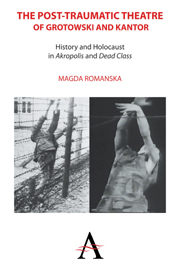 The Post-traumatic Theatre of Grotowski and Kantor
The Post-traumatic Theatre of Grotowski and Kantor from Part I - Our Auschwitz: Grotowski's Akropolis
Akropolis was relatively better received in Poland than Grotowski's other productions. However, it generated as much discussion and controversy as his other shows. At a symposium to commemorate Wyspiański's 100th birthday in 1969, organized by Jagiellonian University, there was a lone suggestion that Grotowski's staging of Akropolis was the most successful production of any of Wyspiański's dramas. However, most critics voiced their discomfort at the production. In his program notes for the production, Flaszen (1962) points out that Grotowski did not add any new lines to the play but merely stripped it to the bare bones of its poetics. Grotowski did make a drastic change in its staging, however, moving the play from Wawel Cathedral to an Auschwitz crematorium. Summarizing the Polish response to this transposition, Konstantyn Puzyna writes: “Like Schiller, Grotowski connects romantic tradition with the twentieth-century avant-garde. This connection was so shocking at that time that it was not easily accepted or understood. […] Grotowski's attempt to profane the two ‘national sacrums seemed particularly sacrilegious.’” In response to Puzyna, Tadeusz Kudliński firmly questions the alternatives:
Grotowski attempts a brave, and sometimes impossible struggle with Romantic poetry and attitude, an attempt at re-evaluation of our deeply rooted mystical and heroic myths. This attempt often evokes offense. But let's ask ourselves what's better? To leave this repertoire in the museum, stage it conventionally as part of one's honorary national pastime? Or use all of our passion to challenge it to see what's left of our Romantic traditions?
To save this book to your Kindle, first ensure [email protected] is added to your Approved Personal Document E-mail List under your Personal Document Settings on the Manage Your Content and Devices page of your Amazon account. Then enter the ‘name’ part of your Kindle email address below. Find out more about saving to your Kindle.
Note you can select to save to either the @free.kindle.com or @kindle.com variations. ‘@free.kindle.com’ emails are free but can only be saved to your device when it is connected to wi-fi. ‘@kindle.com’ emails can be delivered even when you are not connected to wi-fi, but note that service fees apply.
Find out more about the Kindle Personal Document Service.
To save content items to your account, please confirm that you agree to abide by our usage policies. If this is the first time you use this feature, you will be asked to authorise Cambridge Core to connect with your account. Find out more about saving content to Dropbox.
To save content items to your account, please confirm that you agree to abide by our usage policies. If this is the first time you use this feature, you will be asked to authorise Cambridge Core to connect with your account. Find out more about saving content to Google Drive.